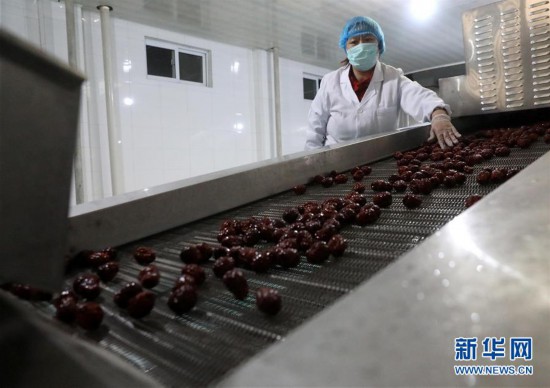

"I just sold over 100 kilograms of sour jujubes, and the unit price was several times higher than that of ordinary green jujubes," said Liu Faxi, a major jujube grower in Lyuzhuang village, Xiyangze town, Zanhuang county, Shijiazhuang city of north China's Hebei Province.
In a bid to shake off poverty, Liu previously grafted ordinary jujube onto its wild relative sour jujube. Later he grafted sour jujube trees onto ordinary ones because of market changes. "Both decisions were made based on market demand," Liu said.
During the past nearly 30 years, Zanhuang county has combined efforts to turn its barren hills into green ones with fattening locals' wallets by developing the jujube industry according to changing conditions.
"We have made constant efforts to turn barren hills into green ones and bring prosperity to farmers," said Chen Hongfeng, Party chief of the county.
The mountainous county of Zanhuang was once a national-level impoverished county, and has a tradition of growing jujube trees. To get out of poverty, the county guided locals to plant ordinary jujube and other trees with economic returns.
Liu was one of the locals who planted jujube on barren hills. Mao Yongmin, an expert from Hebei Agricultural University previously selected premium varieties of ordinary jujube trees at Liu's jujube orchard. Benefiting from techniques learned from Mao, Liu became one of the best jujube growers in the county.
Zanhuang has turned ordinary jujube into one of the major industries for locals to expand their incomes. The planting area of ordinary jujube once reached 450,000 mu (30,000 hectares) in the county.
By planting jujube trees, the county has not only lifted tens of thousands of people out of poverty, but also won national-level accolades such as "model county in greening efforts." In Zanhuang county, 61.5 percent of rural labor workers are engaged in the ordinary jujube industry.
Dahedao village in the county is home to 12,000 mu of jujube orchards, and 80 percent of villagers' income comes from ordinary jujubes.
However, the county's jujube industry once hit headwinds. Due to factors like pests, it was difficult for ordinary jujubes to turn red and some growers sold mainly green jujubes for a long time. To make matters worse, the price of green jujubes plummeted, leaving tens of thousands of jujube orchards abandoned in the county.

Photo taken on April 9, 2020 shows a worker washing jujubes at an agricultural products development company in Zanhuang county, Shijiazhuang, north China’s Hebei Province. (Photo taken by Chen Qibao/Handout via Xinhua)
However, the sour jujube industry is thriving in Gushan village in Zanhuang, which boasts a large area of wild sour jujube trees. Sour jujube kernel is a kind of herbal medicine that can improve sleep quality.
According to 52-year-old Yu Mingzhi, Party secretary of Gushan village, over 30 years ago, several villagers earned a decent income by selling sour jujube kernels from the wild sour jujubes they harvested in the mountains to a traditional Chinese medicine (TCM) market in Anguo, a county-level city overseen by Baoding city in Hebei.
In around 1994, a sour jujube kernel market emerged in the village. A few villagers purchased sour jujubes from provinces including Shanxi and Henan, took the kernels out of sour jujubes in the village, and then sold them to TCM markets and pharmaceutical factories in other places.
At present, 1,100 households in the village are engaged in the processing and trade of sour jujube kernels, including over 200 households with their own companies.
The price of sour jujube kernels has risen to over 800 yuan (about $112.81) per kilogram. "There are over 100 households with annual turnover exceeding 10 million yuan in our village," said Yu.
Driven by Gushan village, Zanhuang county has become one of China's largest distribution centers of sour jujube kernels, with the annual processing and trade volume accounting for 70 percent of the national total.
To protect its ecology, the county government closed 43 sour jujube kernel workshops that failed to meet environmental requirements last year.
Additionally, the county introduced Hebei Jiuhui Biotechnology Co., Ltd. (Jiuhui) to see to the processing of sour jujube kernels. It also introduced two leading companies that specialize in the deep processing of sour jujube kernels to extend the industrial chain. Last year, Jiuhui started building the county's sour jujube industrial park to develop the whole sour jujube industrial chain, including standardized cultivation, primary processing and intensive processing, and helped ensure stable income growth for farmers.
In recent years, the county government has invited experts to formulate a development plan for the sour jujube kernel industry. At present, sour jujube trees have been grafted onto ordinary jujube trees on 40,000 mu of land. That figure is expected to reach 100,000 mu within three years. In addition, Zanhuang sour jujube kernel has been recognized as a geographical indication product in China.
"We have implemented the 'lucid waters and lush mountains are invaluable assets' development concept through concrete actions. We are more determined to pursue green development that prioritizes eco-environmental conservation and protection," said Chen.
点击右上角![]() 微信好友
微信好友
 朋友圈
朋友圈

请使用浏览器分享功能进行分享
